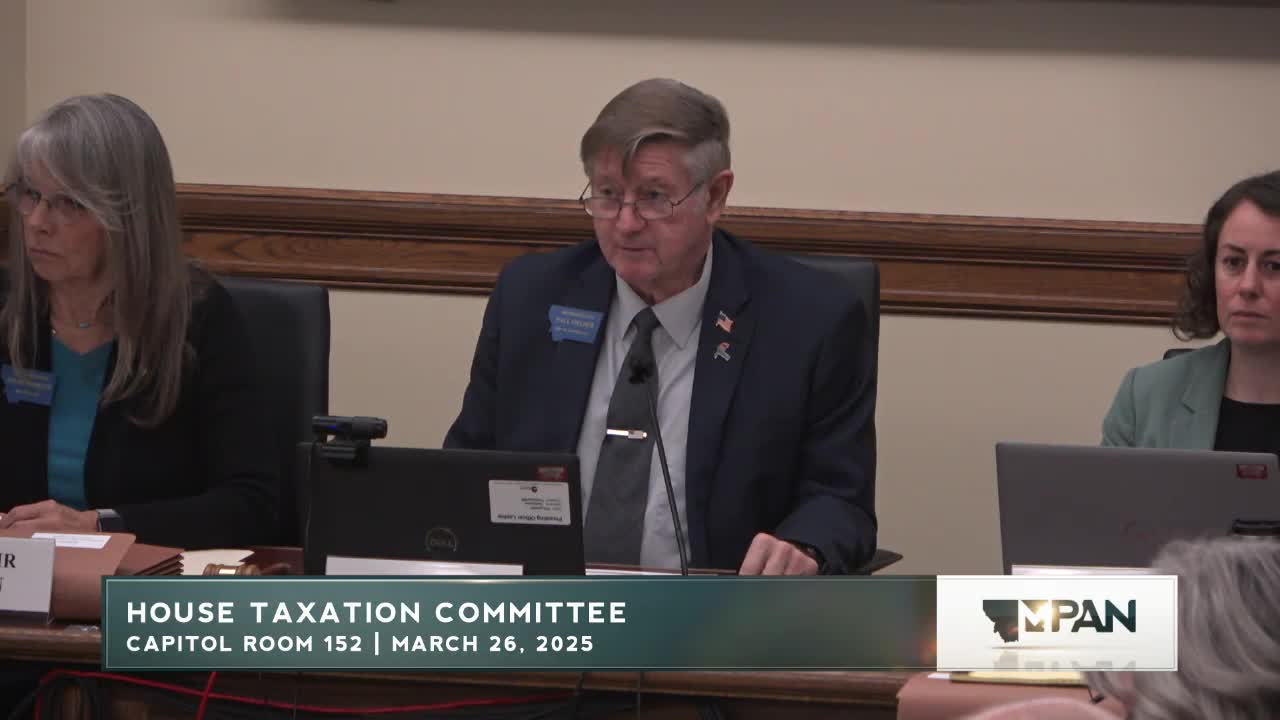Committee hears paired proposals to reserve any statewide sales tax for education property-tax relief
Get AI-powered insights, summaries, and transcripts
Subscribe
Summary
Representative Brad Barker asked the House Taxation Committee to send two measures to voters that would restrict any future statewide sales tax so revenue could be used only to buy down property-tax mills that fund K‑12 schools and the Montana University System.
Representative Brad Barker, sponsor of House Bills 841 and 842, told the House Taxation Committee that the proposals would constrain any future statewide sales tax so its revenue could be used only to reduce the property-tax mills that fund public education and the Montana University System.
"This is not a sales tax. It's a further restriction on sales tax," Barker said, adding the constitutional amendment in HB 841 would require voter approval and the statutory measure in HB 842 would ask voters whether the Legislature should be authorized to consider a sales tax not to exceed 4 percent, with a set of exemptions for basic necessities.
Proponents told the committee the pairing is a way to give Montana voters a mechanism to reduce property taxes that largely fund education. Bob Story of the Montana Taxpayers Association said a sales-tax revenue stream collected in retail centers could be spread statewide through the state’s education funding system. Lance Melton of the Montana School Boards Association said a capped sales tax could be calibrated to replace specific levies — for example, he said roughly 1.5 percent could eliminate the state’s 95 mills under current estimates — and added that a statewide approach would ease administration and equalize funding.
Support also came from local-government and farm organizations. Prairie County Commissioner Todd Devlin and Ross Butcher (local government interests) testified in favor, and Nicole Rolfe of the Montana Farm Bureau Federation said farmers and ranchers support exploring broader-based revenue for education.
Opponents warned of regressivity and volatility. Rose Bender of the Montana Budget and Policy Center said replacing property tax with a retail sales tax would shift tax burdens onto lower- and middle-income households and make school funding dependent on a more cyclical revenue source. Amanda Curtis of the Montana Federation of Public Employees and Amanda Frickle of the Montana AFL‑CIO urged the committee not to put the substitution question to voters, arguing it creates a false dichotomy between funding schools and protecting taxpayers. Jasmine Krotkov of the Montana Farmers Union said voters will see any ballot question as a referendum on a sales tax and that rural households could be disproportionately affected.
The hotel and hospitality sector sought a technical fix. A representative of the Montana Lodging and Hospitality Association raised concerns that existing lodging and facility-use taxes could be swept into a new statewide restriction; Barker handed out an amendment to add the words "general statewide" to the constitutional language and said the change was intended to make the restriction apply only to a general statewide sales tax.
Barker told committee members HB 842 was intentionally written at a high level, using "may" to make it a voter survey of whether the Legislature should be empowered to consider a capped sales tax. He said exclusions in the bill (lines 14–20) are intended to exempt basic necessities and to avoid "pyramidization" (taxing business inputs). Department of Revenue tax-policy analyst Finn McMichael appeared as an informational witness and was available to answer technical questions.
During committee questioning, members probed how exemptions would treat new-home construction, online purchases, business inputs and appliances; Barker repeatedly said detailed definitions would be part of implementing legislation if voters approved a sales-tax authority. Representative Thane asked why the sponsor did not run both measures at once; Barker answered that ballot-law constraints limit combining constitutional and statutory issues and that the two bills are separate steps to send questions to voters.
The committee closed the hearings on HB 841 and HB 842 and moved on to the next agenda items. No committee votes on either bill were recorded in the transcript portion provided.
Why it matters: the pair of measures would change how Montana balances reliance on property tax for schools by creating a constitutionally protected route to use retail sales tax revenue solely for education property-tax relief. Supporters say it equalizes funding; opponents say it risks shifting tax burden to lower-income households and relying on a volatile revenue source.
